These videos were created for providers and clinicians who want to learn how to conduct the Saferteens Intervention.
The following clips are examples of the Saferteens Intervention in action. Our team has created three full-length sessions, and many shorter clips of sections/screens of the intervention for you to experience and practice the Saferteens Intervention. We have additionally created a clip of a "bad" therapist, a non-talkative patient, and a patient who defends their behavior to aid you if you ever face these challenges.
For optimal viewing, we suggest using 720p resolution or higher.
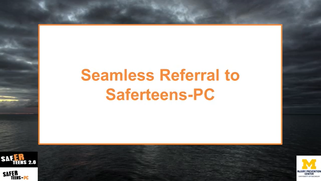 |
A Seamless Referral to the Saferteens Interventionist with a Female PatientThis is an example of a patient-centered, Motivational Interviewing-based approach to a "seamless referral." This example can be adapted to your clinic and the way you provide care to your patients. Length: 4m 19s To watch video, click on the picture to the left of this sentence or click here |
 |
A Seamless Referral to the Saferteens Interventionist with a Male PatientThis is an example of a patient-centered, Motivational Interviewing-based approach to a "seamless referral." This example can be adapted to your clinic and the way you provide care to your patients. Length: 3m 24s To watch video, click on the picture to the left of this sentence or click here |
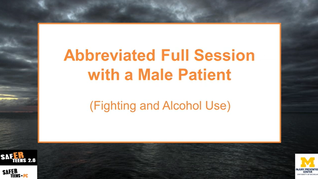 |
Abbreviated Session with a Male PatientThis is an example of a full intervention session with a male patient with a history of fighting and alcohol use. This session is presented in an "abbreviated" format to simulate how the Saferteens-PC intervention can be delivered in a time-constrained setting. See the following two videos for examples of longer sessions. Length: 38m 37s To watch video, click on the picture to the left of this sentence or click here |
 |
Full Session with a Female PatientThis is an example of a full session with a female that has a history of fighting and alcohol use. Length: 1hr 6m To watch video, click on the picture to the left of this sentence or click here |
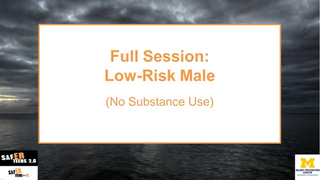 |
Full Session with a Male PatientThis is an example of a full session with a male that has low levels of current violence and no substance use, but has a history of violent behaviors. Length: 57m 36s To watch video, click on the picture to the left of this sentence or click here |
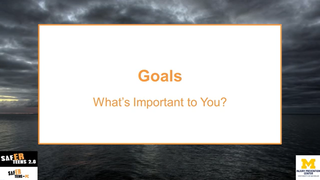 |
What's Important to You? (Goals/Values)In this section of the intervention, elicit and explore your patient's goals and values. The goal of the section is to build rapport with your patient and affirm positive thoughts and actions. Length: 9m 18s To watch video, click on the picture to the left of this sentence or click here |
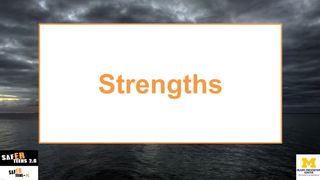 |
What are you good at? What have you done? (Strengths)In this section of the intervention, elicit and explore your patient's strengths. The goal of the section is to build rapport with your patient and gain trust. Length: 3m 07s To watch video, click on the picture to the left of this sentence or click here |
 |
A Female AggressorThe goal of the section is to learn about your patient’s past experiences with dating violence, and elicit and explore how it has or could impact their goals. Length: 18m 26s To watch video, click on the picture to the left of this sentence or click here |
 |
A Female VictimThe goal of the section is to learn about your patient’s past experiences with dating violence, and elicit and explore how it has or could impact their goals. Length: 6m 06s To watch video, click on the picture to the left of this sentence or click here |
 |
A Male AggressorThe goal of the section is to learn about your patient’s past experiences with dating violence, and elicit and explore how it has or could impact their goals. Length: 7m 07s To watch video, click on the picture to the left of this sentence or click here |
 |
A Male VictimThe goal of the section is to learn about your patient’s past experiences with dating violence, and elicit and explore how it has or could impact their goals. Length: 3m 49s To watch video, click on the picture to the left of this sentence or click here
|
 |
A Patient with Low Risk of Dating Violence (Male)The goal of the section is to learn about your patient’s past experiences with dating violence, and elicit and explore how it has or could impact their goals. Length: 3m 13s To watch video, click on the picture to the left of this sentence or click here |
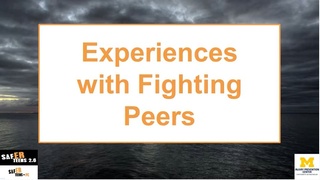 |
Experiences with Fighting Peers (excluding Dating Partners) The goal of this section is to learn about your patient's past experiences with violence and how it has or could impact their goals. Length: 18m 28s To watch video, click on the picture to the left of this sentence or click here |
 |
Patient with Frequent Marijuana UseThe goal of this section is to learn about your patient's experiences (if any) with substances, and to learn how they view their substance use and its impact or potential impact on their goals. Length: 11m 19s To watch video, click on the picture to the left of this sentence or click here |
 |
Patient with High-Risk of Substance AbuseThe goal of this section is to learn about your patient's experiences (if any) with substances, and to learn how they view their substance use and its impact or potential impact on their goals. Length: 11m 01s To watch video, click on the picture to the left of this sentence or click here |
 |
Patient with Low-Risk of Substance AbuseThe goal of this section is to learn about your patient's experiences (if any) with substances, and to learn how they view their substance use and its impact or potential impact on their goals. Length: 4m 20s To watch video, click on the picture to the left of this sentence or click here |
 |
Patient with Prescription Drug MisuseThe goal of this section is to learn about your patient's experiences (if any) with substances, and to learn how they view their substance use and its impact or potential impact on their goals. Length: 11m 46s To watch video, click on the picture to the left of this sentence or click here |
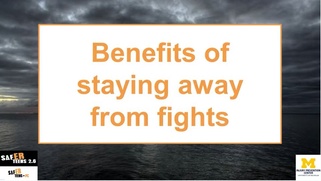 |
Benefits of Staying Away from FightsThe goal of this section is to elicit and explore your patient's reason to stay away from fights. Elicit the negative impacts fights may have on their goals. Identify tools that they have used in the past that have kept them safe and have helped them avoid fights, and affirm past successes at avoiding fighting and any positive changes in thinking, attitude, or behavior. Length: 5m 16s To watch video, click on the picture to the left of this sentence or click here |
 |
Scenario 1 -- Peer ViolenceTo keep with the spirit of MI, we encourage you to personalize details in the scenario to make them more fitting for your patient. Through these role-plays you are creating a safe environment for the patient to establish tools that they could use the next time a situation like this happens. Each scenario has several key messages; you should go through as many key messages as you can that are relevant to your discussion with the participant until you feel you have fully explored the scenario. Length: 4m 53s To watch video, click on the picture to the left of this sentence or click here |
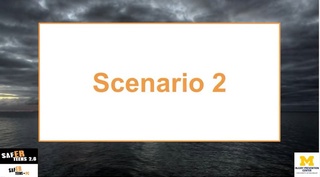 |
Scenario 2-- Dating ViolenceTo keep with the spirit of MI, we encourage you to personalize details in the scenario to make them more fitting for your patient. Through these role-plays you are creating a safe environment for the patient to establish tools that they could use the next time a situation like this happens. Each scenario has several key messages; you should go through as many key messages as you can that are relevant to your discussion with the participant until you feel you have fully explored the scenario. Length: 4m 58s To watch video, click on the picture to the left of this sentence or click here |
 |
Scenario 3 -- Alcohol and Other Drug UseTo keep with the spirit of MI, we encourage you to personalize details in the scenario to make them more fitting for your patient. Through these role-plays you are creating a safe environment for the patient to establish tools that they could use the next time a situation like this happens. Each scenario has several key messages; you should go through as many key messages as you can that are relevant to your discussion with the participant until you feel you have fully explored the scenario. Length: 5m 28s To watch video, click on the picture to the left of this sentence or click here |
 |
Scenario 4 -- Retaliation, Peer Pressure and Alcohol/Drug UseTo keep with the spirit of MI, we encourage you to personalize details in the scenario to make them more fitting for your patient. Through these role-plays you are creating a safe environment for the patient to establish tools that they could use the next time a situation like this happens. Each scenario has several key messages; you should go through as many key messages as you can that are relevant to your discussion with the participant until you feel you have fully explored the scenario. Length: 9m 32s To watch video, click on the picture to the left of this sentence or click here |
|
|
Final SummaryIn this section of the intervention, the goal is to reflect with the patient on their goals, their motivations for staying away from fights, and to link together selected tools that aid in staying away from fights with personal strengths and goals. Additionally, affirm positive thinking, behavior, confidence, and plans for the future. Length: 2m 47s To watch video, click on the picture to the left of this sentence or click here |
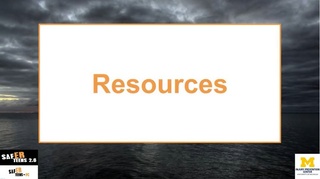 |
ResourcesBuilt into this intervention screen is the ability to send a link to national resources to either the patient's email or phone (through text). See the "Resources" tab above for more information on what resources are included in this link. Length: 2m 04s To watch video, click on the picture to the left of this sentence or click here |
 |
Next StepThis is the last screen of the intervention. The goal is to solidify something that the patient can do in the next few weeks to get them closer to their goals and help them stay away from situations where violence is most likely. Length: 1m 31s To watch video, click on the picture to the left of this sentence or click here |
 |
Difficult Situation: Good Therapist turns "Bad"This is an example of a therapist using controlling language, not meeting the patient where they are in life, and trying to push the patient to make a behavior change when they may not be ready. Be aware of these therapy traps. Especially ones when you start giving a lot of facts, or start lecturing a patient. After you watch this clip, watch the high-risk male dating violence script to see other techniques you could use in your sessions. Length: 5m 02s To watch video, click on the picture to the left of this sentence or click here |
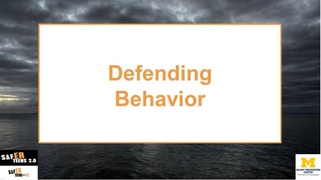 |
Difficult Situation: Patient Defending their BehaviorThe goals of this clip is to learn what to do if a patient defends their risky behavior and shows no interest in behavior change. In these circumstances, it is important to remember to be respectful, non-judgmental, and non-confrontational. Length: 5m 31s To watch video, click on the picture to the left of this sentence or click here |
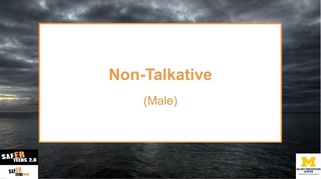 |
Difficult Situation: Non-Talkative PatientThe goal of this clip to is to learn what to do in situations when patients may be reluctant to engage in the therapy session, or may not be participating as much as you feel they should. If this happens, remember to meet the patient where they are at. Use reflective listening, and reflect on why they are not talking. Sometimes letting those moments of silence sit, can open a patient up. They may be non-talkative for many reasons, for example, they may be processing and need time, don’t assume why they aren’t giving you the information you want. Length: 5m 02s To watch video, click on the picture to the left of this sentence or click here |